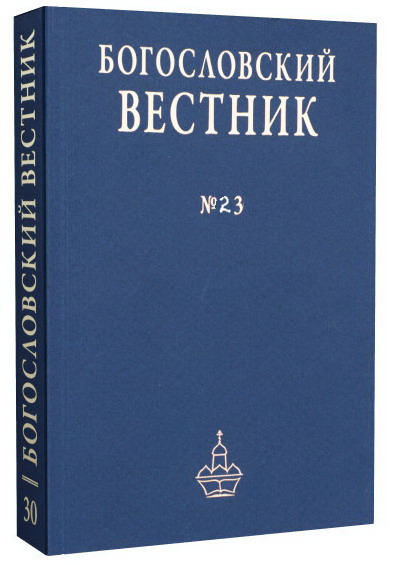The doctrine of the Logos in metaphysics and cosmology of St. Maximus the Confessor: an exercise in systematization
Keywords:
Maximus the Confessor, metaphysics, ontology, doctrine of ideas, patristic, theology, cosmology, knowledge of God, deificationAbstract
The article deals with the place of the logos of essence in the metaphysical and cosmological thought of St. Maximus the Confessor. The author's original classification of logos according to the three modes: the ideal (logos as the Divine plan), the real (logos as the essence of a thing) and the mental (logos as the object of knowledge) is proposed. As divine intentions, the logoi eternally existed in God, and according to them God brought everything into being. At the same time the logoi are not connected with the Divine essence, but they correspond to the level of Divine energies and will. All logoi, both the particular and the general, are united in the Divine Logos - the God of the Son, who is both their center and the transcendental Primordial. In the created world the logoi correspond to the forming principles that are inherent in existence and which determine the essence of each thing and its basic natural properties and characteristics, as well as the purpose of its existence. Along with the universal logoi there are also logoi of individuals. All logoi form an ontological hierarchy, which determines the entire diversity of created beings, as well as their internal natural unity and various interrelationships between them. Invisible logoi, when scattered in the world, can become the object of rational knowledge, gradually leading a person to the knowledge of God and the union with God, that is, to deification, which is the ultimate goal and divine plan for the created world.
Downloads
References
Бриллиантов А. И. Влияние восточного богословия на западное в произведениях Иоанна Скота Эригены. СПб., 1898; М., 1998.
Епифанович С. Л. Преподобный Максим Исповедник и византийское богословие. Киев, 1915. М., 1996.
Каприев Г. Византийска философия. София, 2011.
Лосский В. Н. Очерк мистического богословия Восточной Церкви. СТСЛ., 2012.
Лурье В. М. История византийской философии. Формативный период. СПб., 2006.
Петров В. В. Максим Исповедник: онтология и метод в византийской философии VII в. М., 2007.
Петров В. В. Логос сущего у Максима Исповедника: проблемы интерпретации // Философские науки. 2007. № 9. С. 112-128.
Петров В. В. Трансформация античной онтологии в «Ареопагитском корпусе» и у Максима Исповедника // Исследования по истории платонизма / Ред. В. В. Петров. М., 2013. С. 376-393.
Balthasar H. U. von. Kosmische Liturgie. Das Weltbild Maximus’ des Bekenners. Freiburg i. B. 1941, Einsiedeln, 19612.
Dalmais I.-H. La théorie des «logoi» des créatures chez S. Maxime le Confesseur // Revue des sciences philosophiques et théologiques. 1952. Vol. 36. P. 244-249.
Karayiannis V. Maxime le Confesseur. Essence et énergies de Dieu. P., 1993.
Larchet J.-C. Introduction // Saint Maxime le Confesseur. Ambigua / Avant-propos, trad., not. E. Ponsoye, comment. D. Staniloae. P., 1994. P. 19-24.
Larchet J.-C. La divinisation de l’homme selon saint Maxime le Confesseur. P., 1996. P. 112-131.
Larchet J.-C. Saint Maxime le Confesseur (580-662). P., 2003. P. 134-136.
Larchet J.-C. Théologie des énergies divines: Des origines à st. Jean Damascène. P., 2010.
Sherwood P. The earlier Ambigua of St Maximus the Confessor and his refutation of origenism. R., 1955.
Thunberg L. Microcosm and mediator. The theological anthropology of Maximus the Confessor. Lund, 1965.
Tollefsen T. The Christocentric Cosmology of St. Maximus the Confessor. A Study of his Metaphysical Principles. Oslo, 1999; Oxford, 20082.
Downloads
Published
How to Cite
License

This work is licensed under a Creative Commons Attribution-NonCommercial 4.0 International License.








